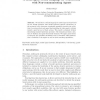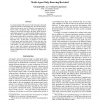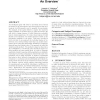230 search results - page 30 / 46 » An Argumentation Based Semantics for Agent Reasoning |
CEEMAS
2003
Springer
14 years 1 months ago
2003
Springer
We introduce a formal language for multi-agent systems based on new modal operators. The modal operators express concurrency at the syntactic level. Operators containing quantifie...
ICNS
2009
IEEE
14 years 3 months ago
2009
IEEE
Some initiatives towards Future Internet, e.g., GENI, DARPA’s Active Networks, argue the need for programmability of the network components. Some other initiatives extend this w...
KR
2010
Springer
14 years 1 months ago
2010
Springer
Levesque introduced the notion of only-knowing to precisely capture the beliefs of a knowledge base. He also showed how only-knowing can be used to formalize non-monotonic behavio...
EKAW
2004
Springer
14 years 2 months ago
2004
Springer
Abstract. Augmenting web pages with semantic contents, i.e., building a ‘Semantic Web’, promises a number of benefits for web users in general and learners in particular. Seman...
PODS
2006
ACM
14 years 8 months ago
2006
ACM
An intelligent agent will often be uncertain about various properties of its environment, and when acting in that environment it will frequently need to quantify its uncertainty. ...



